The 5: Katie Compa’s Five Foreign Words English Needs


Little Lamb Recordings announced the release of HARD PASS, the debut comedy album from New York’s Katie Compa. Katie is a woman who knows what she wants, or more importantly, what she doesn’t want, and is more than happy to let us know exactly why. ‘Hard Pass’ debuted on Friday the 13th, and was recorded in front of a live audience at the legendary Duplex in Greenwich Village. Katie is based in New York City and her particularly brilliant brand of deadpan sarcasm has earned her recognition at San Francisco Sketchfest, the Brooklyn Comedy Festival, and stages throughout the country and around the world.
In Hard Pass, Katie covers her Icelandic background, her feminist dad, white people who think they’re helping, her absolute aversion to having children, and being asked for anti-aging tips while still in her mid-30s.
To celebrate the album release, Katie created an awesome edition of The 5 for us. Five foreign words that American’s really need, but there’s just no English translation for them. And she didn’t even take the easy road by packing this list with Yiddish, Italian and Spanish words.
Enjoy! And get Katie’s album, “Hard Pass” everywhere albums are sold including Apple Music and Amazon. Learn more at www.katiecompa.com.
The 20-volume Oxford English Dictionary contains 171,476 English words in current use, but we need more. I’m not just saying this as an evangelist for DuoLingo (although I am learning to say “thank you,” “I’m sorry,” and “Will you marry me?” in as many languages as possible—my version of doomsday prepping). Here are my picks from five languages:
Finnish: Kalsarikännit
I don’t hate anything as much as bottle service. I am a grown woman and I want a nice glass of a dry red from a knowledgeable sommelier, not a screwdriver I have to mix myself with ingredients delivered by what appear to be semi-nude middle school students armed with sparklers. Listen, I’m a Capricorn. I was born spiritually in my early-to-mid sixties and that’s where I live: I love to sleep eight hours a night, I can knit, and as soon as I’m old enough to retire, I plan to solve mysteries. The Finns are here to help me out: Kalsarikännit is the word for drinking, at home, in your underwear, with no intention of going outside. I had a Finnish friend help me pronounce it correctly and demo it with an ’06 Cabernet!
Tagalog: Gigil
Kittens! So cute, right? So cute it’s… frightening? Cuddling anything cute and helpless—a kitten, or a puppy, or if I must, a human baby—causes corresponding brain regions to light up on a brain scan. Right next to the sector that causes me to squeal “omg, it’s so cute!” is an area that controls a sudden and intense urge to crush it to death. To be clear, every cute animal and/or baby I’ve met has survived our encounter (and some ugly ones too, although relatively speaking, they evidently aren’t in danger). In English it’s called “cute aggression,” and an estimated half of people feel it. I don’t know of another language with a word for it, but I was relieved to find at least one that doesn’t classify me a barely restrained kitten assassin who could crack at any moment, because that kind of pressure makes a girl experiencing intense gigil feel very on edge.
French: Dépaysement
I love France and I love French food. A flute of champagne, toast points with foie gras, an assiette of fromage that ideally smells like the feet of a sassy street urchin. I’ve never lived abroad, but I am well traveled, and when I’m out of the country for more than a week or two, I’m sick of haute cuisine. The best and only cure for my dépaysement – the feeling of being expatriated, or a foreigner– is McDonald’s six-piece chicken nuggets with sweet & sour sauce, fries and a small Coke. I can resist a corporate coffee conglomerate, but I’m helpless before a Happy Meal. The last one I bought was on tour in Sweden last month, and the toy was a book. Have you ever heard of a book in a Happy Meal? This brings me to:
Swedish: Orkar
Generally speaking, anyone younger than 50 in Sweden could routinely outperform any of us on the verbal SAT, then beat us at Jeopardy! for free. Swedes know us and our culture pretty thoroughly, but as a country we don’t pay much attention to theirs beyond what we’ve adopted—like Robyn, meatballs, and IKEA (meatballs at IKEA with Robyn?!). They have lots of contenders for words we need: Lågom means “the perfect amount of something;” sambovikt is the name for the weight you gain in a relationship; and depending on context, gift means either “married” or “poison.” (I get it!) But my nominee is orkar, “to have enough energy to do something” (or as I translate it, “to can even.” As in, “I didn’t orkar to shower today,” (it is a lot of work!) “but luckily, I just bought baby wipes.”
German: Verschlimmernbessern
Fully 80% of the German language consists of smaller words smashed together, which makes translations sometimes obvious, sometimes absolutely brutal: Schadenfreude is “damage joy.” Pretty straightforward; eventually, we get to the good stuff, like Kummerspeck, “grief bacon,” for weight gained from stress eating; Backpeifengesicht, “a face that needs a fist,” for conversations about politics and/or comedy; and Handschuhschneeballwerfer, literally a “gloved snowball-thrower”—a coward who won’t say things to your face, which I personally would have deployed in at least two school and/or workplace settings, had it been in my vocabulary at the time. Anyway, Verschlimmenbessern is “making something worse by trying to make something better,” and if you don’t find it relatable, you’ve probably never gone on a date with me.
Album Cover by Mindy Tucker.

